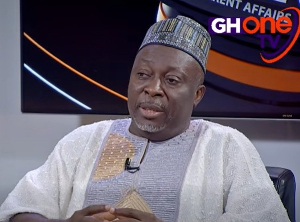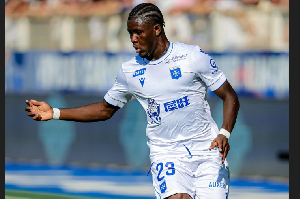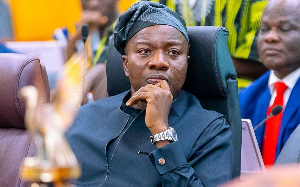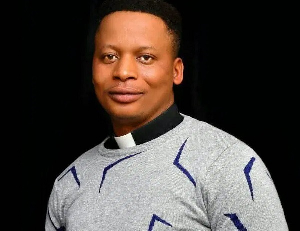Opinions of Saturday, 30 June 2012
Columnist: Kennedy, Arthur Kobina
Election Debates
University of Cape Coast—Cape Coast.
1ST July, 2012.
Debates between candidates at all levels during elections are becoming the norm rather than the exception.
This American innovation has gone global. Indeed, here in Africa, a large part of Ghana’s reputation from the 2008 elections, in addition, of course, to the closeness of the elections, was the Presidential debates that involved all the major candidates. It was therefore a surprise when the Propaganda Secretary of the ruling NDC announced that the President and the Vice-President would follow the Ghanaian tradition of sitting Presidents and Vice-Presidents skipping debates. I shall return presently to President Mills, who, despite claiming to have unprecedented achievements, does not wish to do the unprecedented by participating in debates. However, let us look at debates broadly.
The modern form of debates during elections probably got its crucial break when in 1858; Senate candidates Abraham Lincoln and incumbent Senator Douglas held seven of them across the state of Illinois. Lincoln lost that election. Two years later, helped by the publicity from the series of debates, Lincoln and Douglas became their respective parties’ nominees and faced off in the 1860 Presidential elections. This time, Lincoln won. Surprisingly, the two candidates did not debate during the 1860 Presidential campaign.
The first modern Presidential debate occurred in the US between Democrat John Kennedy and Republican Richard Nixon, who was then the sitting Vice-President, in 1960.Now, debates are a routine part of US elections at many levels. Indeed, they have spread to many other countries, including Canada, Mexico, France and recently Britain. Thus, political aficionados, to some extent, expect any election campaign worthy of its name to have debates.
Unfortunately, the spread of Debates have been rather slow in the third world, particularly in Africa.
Given the obvious benefits of debates, it is difficult to understand why African leaders have been so reluctant to jump on the debate band-wagon.
Debates have many benefits:
- They help voters take a measure of the candidates on the same stage
- They give candidates who have been criticizing each other or one another a chance to repeat those criticisms in the presence of their opponents and for the opponents to rebut those charges
- They give voters a chance to see the candidates’ composure under pressure
- They give moderators or the public a chance to ask the candidates questions they have been trying to avoid.
Of course, like everything else, they have a down-side too—for candidates. They can expose the ignorance of a candidate before millions of voters. They can put a candidate’s lack of poise or sometimes lack of good manners on display for all to see.
Perhaps, the reason why the voting public love debates so much is the drama associated with it. Looking around the world and across history, debates have produced some memorable moments.
In 1980, towards the end of the only debate with President Carter, former California Governor Ronald Reagan, in his closing statement, posed the question that crystallized the election and may have given him victory. It was, “Are you better off than you were four years ago?” The voters decided the answer to that question was “No” and they voted Carter out. In Canada in 1984, after Prime Minister Trudeau left office for Turner, he faced Conservative Brian Mulroney in a pivotal debate. Unfortunately for the new Prime Minister, the departing Prime Minister had made hundreds of patronage appointments that were very unpopular. When the matter of these appointments was brought up, Mr. Turner said “I had no option.” Mr. Mulroney retorted, waging his finger in the Prime Minister’s face for emphasis, “You had an option, Sir—to say “No””. With that exchange, the election was virtually over.
In France, seeking re-election against his Prime Minister Jacques Chirac, President Francois Mitterrand got into a dispute on a conversation the two had had. Said Chirac, “Do you remember I told you ---? ““No, I do not”, replied the President firmly as millions watched unable to decide who was telling the truth in the encounter that had no witnesses.
Across the world, debates have been watched by large audiences. In the United States in 2000, 62.5 million watched the first debate in 2000 between Bush and Gore while about half of French voters watched the Sarkozy-Hollande debate this year.
To return to President Mills, why is the man with unprecedented achievements refusing an opportunity to tout those achievements? Is he running away from the certain scrutiny he will face in a debate? Are African leaders afraid of debates? Just like Mills now, Nigeria’s Goodluck Jonathan managed to avoid a face-to-face encounter with his opponents during his re-election campaign last year. He did not want to trust his legendary luck in a face-to-face encounter with Buhari et al. Later on, President Jonathan managed to have his own debate unchallenged. As for President Mills, it appears that just as he did in the 2000 campaign, he is taking bad advice. If indeed, he believes his record in office is unprecedented, why would he avoid a chance to tout that record in front of what will certainly be a record audience? It would be great to have the moderator turn to the President in a debate and ask, ‘Mr. President, your opponents, including some of those on the platform here have accused you of being asleep at the steering wheel of the Yutong bus while people made off with gargantuan amounts of our money. Tell us, your Excellency; what did you know and when did you know it? Are we ever going to get that 51 million cedis back or it is just gone?” This would be a chance for the law Professor to walk the nation through ‘Woyomegate” and how he plans to solve it. There are of course other questions that he will never have a chance to answer in the presence of his opponents and that is a shame. Indeed, there are even questions to his opponents that should ideally be answered in the President’s presence and that will never happen. In 2000, heading into the elections, then Vice-President, in robust health, was at the height of his rhetorical powers. The NPP strategists had spent many a sleepless night agonizing about what would happen in a debate between him and candidate Kufuor. Then, to the NPP’s surprise and relief, the NDC decided that Mr. Mills would skip the debate. Whoever gave President Mills that advice should have been included in that long list of Ghanaians who were honoured by President Kufuor. This will be a surprise to many because with the passage of time, President Kufuor’s stature as a statesman has grown and we have had a chance to observe his towering strengths. But then, fluidity in debate was not considered one of his considerable strengths as a candidate. Under the circumstances, President Mills’s best strategy would have been to show up and show mastery of the intricacies of government, in contrast to what would have been Mr. Kufuor’s lack of sureness. But alas, Professor Mills was a no-show. This time, with a record he claims to be unprecedented, the President plans to be, once again, a “no-show” and that will be to the advantage of his opponents.
While the President and Mr. Mahama’s absence will hurt them, it will hurt Ghana even more. Even though concerns raised about how the IEA Debate panel was selected have some merit, its defects can be cured. I urge that instead of asserting that the absence of the President and Vice-President from the debates will not matter, the IEA should go back to the table and re-plan the debates. There should be broad consultations with all the stake-holders, including all the candidates. These consultations should discuss the number of debates, the formats and the dates. Furthermore, it should attempt to gain prior commitments to have the two candidates debate if there is a second round.
In the end, we should have Presidential and Vice-Presidential debates that include the incumbents. Our democracy requires that. Our reputation demands it and President Mills owes it to us to stand and defend his unprecedented achievements, not hide behind customs or Mrs. Mills.
Let us debate our way forward, forward—together.
Arthur Kobina Kennedy














